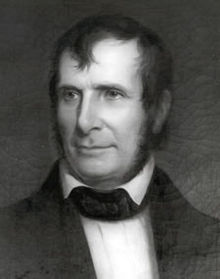Francis Rawn Shunk
Francis Rawn Shunk (born August 7, 1788 in Trappe , Pennsylvania , † July 20, 1848 in Harrisburg , Pennsylvania) was an American politician and from 1845 to 1848 the tenth governor of the state of Pennsylvania.
Early years
After finishing school, Shunk began teaching himself at the age of 15. After studying law, he was admitted to the bar in 1816. Since 1810 he was employed by the administration of the state of Pennsylvania. During the war of 1812 he was among the forces who successfully defended the city of Baltimore against the British.
Political rise
After the war he was employed in the administration of the state parliament. He owed this post to the then governor William Findlay , who also became his father-in-law in 1820. Between 1829 and 1839 Shunk was secretary of a commission for the supervision of the development of the waterways ( Board of the Canal Commission ). During this time, many canals in Pennsylvania were built or expanded. Shunk was a member of the Democratic Party , which in those years had a heated argument with the short-lived Anti-Masonic Party . The political tensions, also within the Democrats, led, among other things, to the proposal to establish a second state parliament, which was not implemented. Shunk campaigned for a balance between the arguing groups. Governor David Rittenhouse Porter (1839-1845) appointed Shunk Secretary of the Commonwealth of Pennsylvania. He resigned prematurely from this office because, in his opinion, he was not granted enough powers. He moved to Pittsburgh and worked there as a lawyer. There he received news in 1844 that he had been nominated by his party as a candidate for the upcoming gubernatorial election in 1845. This was only made possible by the death of the intended candidate Henry AP Muhlenberg . Shunk had been nominated as a candidate for intra-party reconciliation and he also succeeded in asserting himself against the Whig candidate Joseph Markle.
Pennsylvania Governor and End of Life
Francis Shunk took up his new office on January 21, 1845. The Mexican-American War fell during his tenure . For this war, Pennsylvania also had to deploy a military force that the governor put together. He also tried to balance the state budget or to reduce the deficit through prudent budget policy. The governor was also against a unilateral preference for banking and business interests. He supported the poor and advocated social compensation. School policy was also promoted by him. To improve the transport situation, a state railway was founded in 1846 with the Pennsylvania Railway. At the end of his first term, Shunk was re-elected to that office in 1847. He started his second term in January 1848, but had to resign on July 9, 1848 because he was hopelessly ill with tuberculosis. He died of this disease just a few days later, on July 20th. The exact place of death is not known. According to the constitution, after Shunk's abdication, Senate President William Freame Johnston was his successor. Francis Shunk was married to Jane Findlay, the daughter of ex-Governor William Findlay. The couple had three children.
Web links
- Francis Shunk in the National Governors Association (English)
- Francis Rawn Shunk in the database of Find a Grave (English)
- The Governors of Pennsylvania
| personal data | |
|---|---|
| SURNAME | Shunk, Francis Rawn |
| BRIEF DESCRIPTION | American politician |
| DATE OF BIRTH | August 7, 1788 |
| PLACE OF BIRTH | Bustard , Pennsylvania |
| DATE OF DEATH | July 20, 1848 |
| Place of death | Harrisburg , Pennsylvania |

